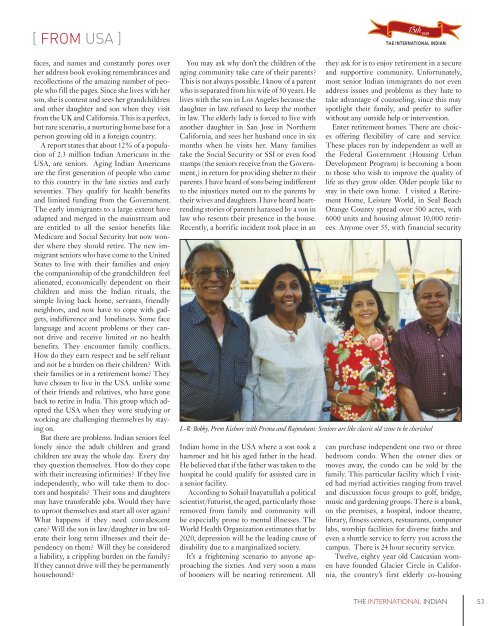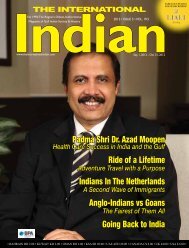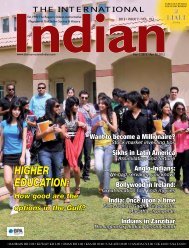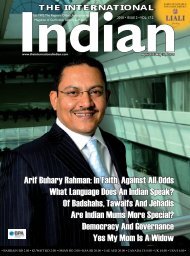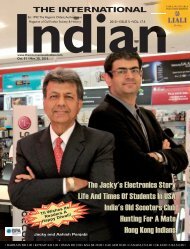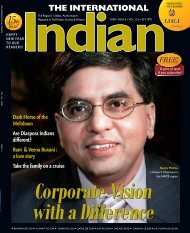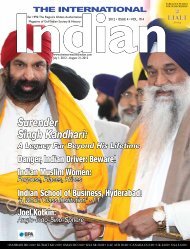THE BUSINESS OF EDUCATION - International Indian
THE BUSINESS OF EDUCATION - International Indian
THE BUSINESS OF EDUCATION - International Indian
You also want an ePaper? Increase the reach of your titles
YUMPU automatically turns print PDFs into web optimized ePapers that Google loves.
[ FROM USA ]<br />
faces, and names and constantly pores over<br />
her address book evoking remembrances and<br />
recollections of the amazing number of people<br />
who fill the pages. Since she lives with her<br />
son, she is content and sees her grandchildren<br />
and other daughter and son when they visit<br />
from the UK and California. This is a perfect,<br />
but rare scenario, a nurturing home base for a<br />
person growing old in a foreign country.<br />
A report states that about 12% of a population<br />
of 2.3 million <strong>Indian</strong> Americans in the<br />
USA, are seniors. Aging <strong>Indian</strong> Americans<br />
are the first generation of people who came<br />
to this country in the late sixties and early<br />
seventies. They qualify for health benefits<br />
and limited funding from the Government.<br />
The early immigrants to a large extent have<br />
adapted and merged in the mainstream and<br />
are entitled to all the senior benefits like<br />
Medicare and Social Security but now wonder<br />
where they should retire. The new immigrant<br />
seniors who have come to the United<br />
States to live with their families and enjoy<br />
the companionship of the grandchildren feel<br />
alienated, economically dependent on their<br />
children and miss the <strong>Indian</strong> rituals, the<br />
simple living back home, servants, friendly<br />
neighbors, and now have to cope with gadgets,<br />
indifference and loneliness. Some face<br />
language and accent problems or they cannot<br />
drive and receive limited or no health<br />
benefits. They encounter family conflicts.<br />
How do they earn respect and be self reliant<br />
and not be a burden on their children? With<br />
their families or in a retirement home? They<br />
have chosen to live in the USA. unlike some<br />
of their friends and relatives, who have gone<br />
back to retire in India. This group which adopted<br />
the USA when they were studying or<br />
working are challenging themselves by staying<br />
on.<br />
But there are problems. <strong>Indian</strong> seniors feel<br />
lonely since the adult children and grand<br />
children are away the whole day. Every day<br />
they question themselves. How do they cope<br />
with their increasing infirmities? If they live<br />
independently, who will take them to doctors<br />
and hospitals? Their sons and daughters<br />
may have transferable jobs. Would they have<br />
to uproot themselves and start all over again?<br />
What happens if they need convalescent<br />
care? Will the son in law/daughter in law tolerate<br />
their long term illnesses and their dependency<br />
on them? Will they be considered<br />
a liability, a crippling burden on the family?<br />
If they cannot drive will they be permanently<br />
housebound?<br />
You may ask why don’t the children of the<br />
aging community take care of their parents?<br />
This is not always possible. I know of a parent<br />
who is separated from his wife of 50 years. He<br />
lives with the son in Los Angeles because the<br />
daughter in law refused to keep the mother<br />
in law. The elderly lady is forced to live with<br />
another daughter in San Jose in Northern<br />
California, and sees her husband once in six<br />
months when he visits her. Many families<br />
take the Social Security or SSI or even food<br />
stamps (the seniors receive from the Government,)<br />
in return for providing shelter to their<br />
parents. I have heard of sons being indifferent<br />
to the injustices meted out to the parents by<br />
their wives and daughters. I have heard heartrending<br />
stories of parents harassed by a son in<br />
law who resents their presence in the house.<br />
Recently, a horrific incident took place in an<br />
<strong>Indian</strong> home in the USA where a son took a<br />
hammer and hit his aged father in the head.<br />
He believed that if the father was taken to the<br />
hospital he could qualify for assisted care in<br />
a senior facility.<br />
According to Sohail Inayatullah a political<br />
scientist/futurist, the aged, particularly those<br />
removed from family and community will<br />
be especially prone to mental illnesses. The<br />
World Health Organization estimates that by<br />
2020, depression will be the leading cause of<br />
disability due to a marginalized society.<br />
It’s a frightening scenario to anyone approaching<br />
the sixties. And very soon a mass<br />
of boomers will be nearing retirement. All<br />
they ask for is to enjoy retirement in a secure<br />
and supportive community. Unfortunately,<br />
most senior <strong>Indian</strong> immigrants do not even<br />
address issues and problems as they hate to<br />
take advantage of counseling, since this may<br />
spotlight their family, and prefer to suffer<br />
without any outside help or intervention.<br />
Enter retirement homes. There are choices<br />
offering flexibility of care and service.<br />
These places run by independent as well as<br />
the Federal Government (Housing Urban<br />
Development Program) is becoming a boon<br />
to those who wish to improve the quality of<br />
life as they grow older. Older people like to<br />
stay in their own home. I visited a Retirement<br />
Home, Leisure World, in Seal Beach<br />
Orange County spread over 500 acres, with<br />
6000 units and housing almost 10,000 retirees.<br />
Anyone over 55, with financial security<br />
L-R: Bobby, Prem Kishore with Prema and Rajmohani: Seniors are like classic old wine to be cherished<br />
can purchase independent one two or three<br />
bedroom condo. When the owner dies or<br />
moves away, the condo can be sold by the<br />
family. This particular facility which I visited<br />
had myriad activities ranging from travel<br />
and discussion focus groups to golf, bridge,<br />
music and gardening groups. There is a bank,<br />
on the premises, a hospital, indoor theatre,<br />
library, fitness centers, restaurants, computer<br />
labs, worship facilities for diverse faiths and<br />
even a shuttle service to ferry you across the<br />
campus. There is 24 hour security service.<br />
Twelve, eighty year old Caucasian women<br />
have founded Glacier Circle in California,<br />
the country’s first elderly co-housing<br />
<strong>THE</strong> INTERNATIONAL INDIAN 53


